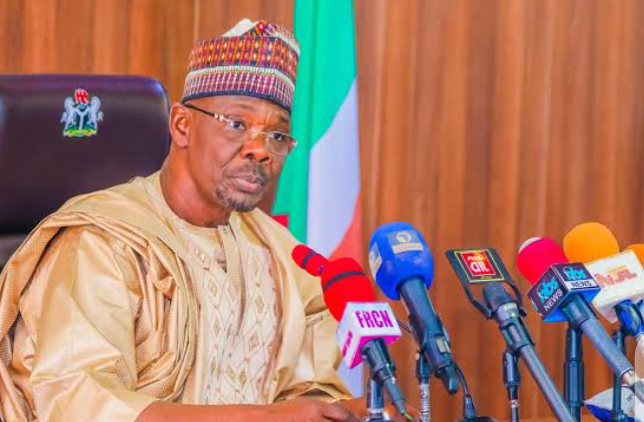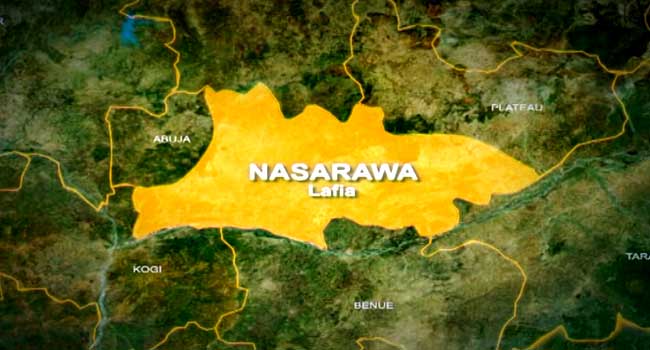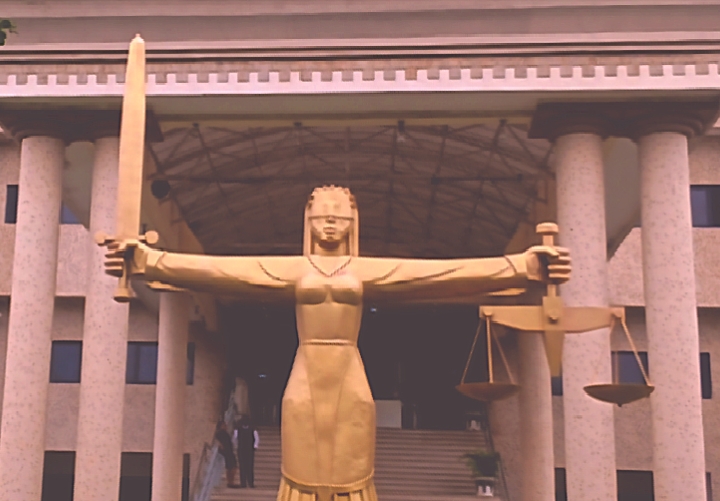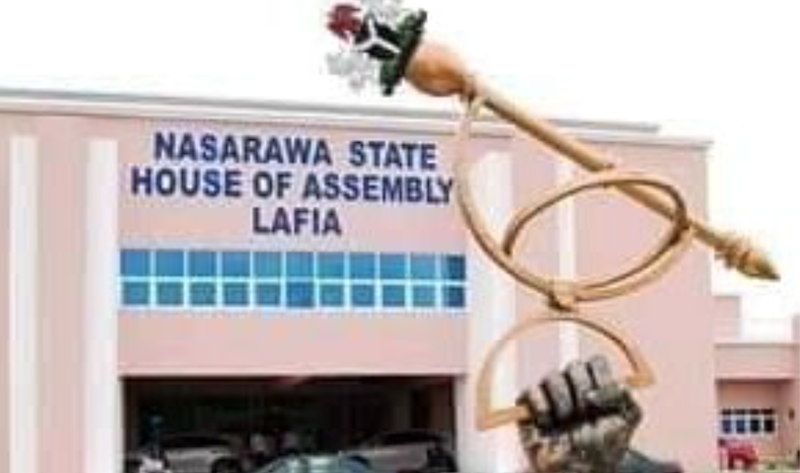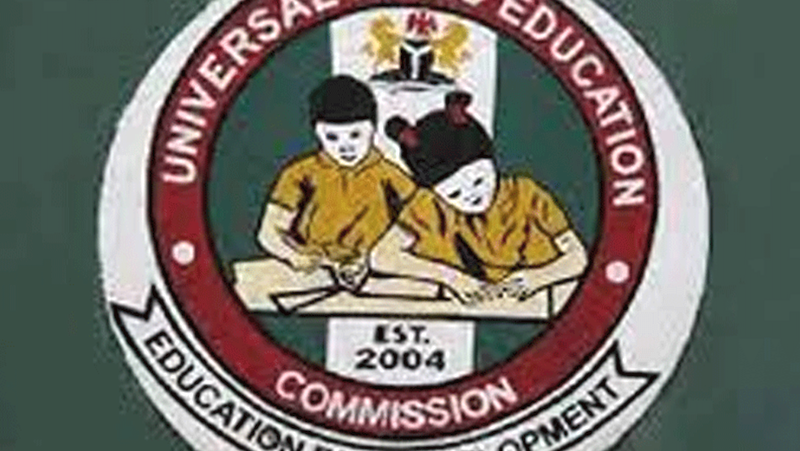By Jeff Ukachukwu
The sun was barely up when I bumped along the laterite road that slices through Jangwa, a quiet corner of Awe LGA that has suddenly found itself at the epicentre of Nasarawa State’s most audacious experiment with large-scale farming. The road was busy with harvesters purring like contented buffalo, disgorging bright-gold paddy into waiting trucks. Only a year ago, this expanse was a mosaic of tiny family plots; today, it is a single, GPS-mapped, 10,000-hectare rice estate the state calls its “proof-of-concept” farm, already completing its first full harvest cycle and planning a second before the rains fade out in October. It is not simply an agricultural project—it is a symbol of how bold governance, technological adaptation, and political will can re-engineer local economies.
It is easy to treat numbers like acreage and yield as abstractions. Still, the revolution underway here was impossible to ignore: young men in reflective vests checked moisture readings on tablet screens, women from neighbouring villages lined up bags of paddy for weighing, and extension agents tagged each truckload with QR codes before it rumbled off toward Lafia. Governor Abdullahi Sule’s 2019 Nasarawa Economic Development Strategy (NEDS) had promised to drag the state “from subsistence to market-oriented agriculture.” Six years on, the ambition no longer sounds like campaign poetry. It has become a policy with consequences. Farms once trapped in the cycle of manual labour and unreliable rain-fed planting now pulse with machines, mapping software, and centralised planning that links fields to factories and markets.
Driving north the next day, I stopped at the Government House in Lafia just in time to see thirty brand-new tractors — scarlet paint still gleaming — being handed over to farmers’ cooperatives. Each unit left the premises equipped with factory-installed telematics that enable officials to track fuel usage, idle time, and even boundary breaches through Mahindra’s DiGiSense platform. This wasn’t merely about distributing tractors—it was a fundamental shift in governance. Public assets were being protected, productivity was being measured, and data was becoming central to statecraft. The governor called it “mechanising trust,” a neat phrase for ensuring that state investments didn’t vanish into private barns or political patronage networks but rather fed the soil of systemic agricultural reform.
Nasarawa’s push is not limited to rice. On a bend of the River Benue near Umaisha, Flour Mills Nigeria is carving out 15,000 hectares for cane and an integrated sugar mill under a $300 million deal — one of the most significant single-estate investments in the state’s history. It is projected to produce over 150,000 tonnes of refined sugar annually, which is sufficient to reduce Nigeria’s import dependence if replicated elsewhere on a significant scale. Two hours west, bulldozers have begun clearing scrubland outside Gudi, where a Chinese consortium is erecting a cassava-to-starch factory, aiming to capitalise on Nigeria’s booming demand for industrial starch in adhesives, pharmaceuticals, and paper. In both cases, Nasarawa is not simply supplying raw crops; it is building end-to-end value chains designed to retain wealth, create jobs, and stabilise prices.
These projects feed a deliberate policy choice: “grow, process, and sell inside the state, not across the Niger bridge,” as one NASIDA official put it. Each ribbon-cutting adds another link to a value chain that used to leak revenue at every stage — from unharvested crops rotting in the field to raw tubers bouncing around on overloaded trucks bound for factories hundreds of kilometres away. With this new model, a farmer in Keana can now not only grow cassava but also deliver it to a starch plant less than 50 kilometres away, receive digital payment within days, and access extension services via a mobile app built under a federal-state partnership. What used to be guesswork is becoming logistics.
Big machinery and bigger cheques grab headlines, but quieter institutional fixes may prove even more durable. In January 2025, Nasarawa clinched a $370,000 grant from the Alliance for a Green Revolution in Africa (AGRA) to update its agricultural policy framework and staff skills. The paperwork may seem mundane, yet it is precisely the kind of back-office capacity that determines whether shiny tractors remain functional and whether investors find a one-stop shop rather than a labyrinth. Rewriting procurement rules, digitising land registry systems, training local governments in budget tracking—all these invisible reforms form the chassis of the state’s agricultural leap.
Meanwhile, the state remains a pilot site for Nigeria’s National Livestock Transformation Plan, which pairs modern ranches with feed-production plots and training centres in the hope of easing the age-old herder-farmer conflict that erupts across the Middle Belt every dry season. In Awe, Doma and Keffi, model ranches are being equipped with veterinary units, feed silos, security infrastructure, and GPS-tagged grazing corridors. The first tranche of NLTP funding — €400,000 from the Dutch government — is earmarked for a model ranch that could change not just livestock productivity but also social cohesion. The project aims to replace seasonal migration with settlement and integration, transforming conflict zones into productive hubs.
Revolutions, even agricultural ones, cast long shadows. In April, more than 2,000 Tiv farmers marched through Obi junction waving placards that read “Our Land, Our Life,” accusing local chiefs of ceding ancestral plots to the Jangwa estate without consent or compensation. Similar protests have simmered around new sugar and cassava concessions. State officials counter that consolidated estates create jobs and feeder roads and that out-grower schemes will eventually enrol the same protesters as contract farmers. Perhaps — but the tension is a stark reminder that land is both an economic asset and cultural identity here and any “revolution” that downplays that reality will stumble. Without equitable land reform and credible community consultation, growth will sit atop a powder keg.
Another concern is climate volatility. The Benue and Mada rivers no longer adhere to their old flood calendars, and each season’s unpredictability introduces risk into even the most sophisticated business plans. In 2022 and 2023, flash floods destroyed over 4,000 hectares of crops in the southern parts of the state, displacing over 10,000 farmers. The government promotes solar-pump irrigation and real-time weather dashboards, but funding for resilient infrastructure remains scarce. The gap between innovative ideas and funded execution could be the Achilles’ heel of this agricultural renaissance.
Walking one afternoon through a patch of rice still waiting to be harvested, I met Yakubu Oche, a 26-year-old who had quit driving a commercial tricycle in Keffi to run a hired combine. “The machine is not mine, but the skill is,” he told me, wiping sweat with the back of his hand. He earns more in two harvest months than he once earned in six on dusty township roads. “If the farm grows, I grow,” he said, gesturing across the shimmering field. His optimism felt genuine — and fragile. His story is one of thousands. Young people once seduced by the dream of city life are now finding a different kind of dignity in mechanised farming—provided they can access equipment, finance, and markets.
Nigeria’s national food-price index has increased by 32 per cent year-on-year, squeezing urban budgets and fueling unrest from Kano to Port Harcourt. Abuja’s emergency food-security programme relies on states like Nasarawa to supply grains and starches quickly. What happens on these 10,000 hectares, therefore, ripples far beyond Awe LGA. A bumper harvest here could stabilise markets in Makurdi and reduce imports into Abuja; a failed one could trigger price spikes in Jos and Kaduna. In that sense, the stakes are national.
Looking back across the estate at dusk, the machines were silent, but the questions were loud: Can new policies outpace old patronage? Will community grievances be resolved before they harden into conflict? Can climate-smart infrastructure arrive in time for the next flood? Will youth like Yakubu be absorbed into a formal agricultural economy or drift once again toward insecurity and idleness?
Revolutions are rarely tidy, and Nasarawa’s is no exception. Yet the physics of change feels different here. The tractors are real; the rice is tangible, and the factory foundations are being poured. There is momentum — and there is the open-ended task of translating that momentum into equitable, climate-resilient prosperity. The world may watch, but Nasarawa’s future will depend on how it balances scale with inclusion, growth with justice, and profit with people.
For now, the harvesters in Jangwa keep inching down their precisely mapped rows, and the pungent smell of newly threshed paddy hangs in the air. It is the scent of possibility — laced, as always, with risk — rising from the red soil of a state that has decided to bet its future on the oldest human enterprise: growing food and growing hope.
Dr Jeff Ukachukwu is a public affairs analyst and writes from Abuja.
